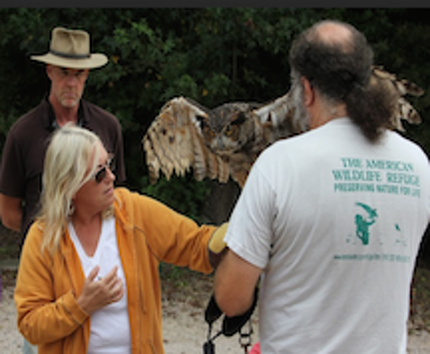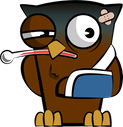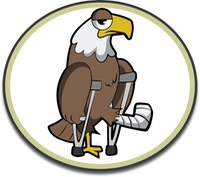
Raptor Education Lab: A class coordinated with Wake Technical Community College
Since 2009, we have offered a wildlife rehabilitation class through Wake Technical Community College. The class is an intensive study class with 5 night classes, once per week, and 3 Sunday afternoon live animal workshops, and is usable as experience towards getting your Raptor rehab license. It is also certified by the NC Veterinary Board for Veterinary Continuing Education.
For information on the 5 week class, call us or visit the WTCC website:
and in the “Find A Class” search box type in “raptor” it will show you to the upcoming course offered.
This course does not give you a license, it gives you some of the experience and knowledge required to apply for federal and state raptor rehab licenses. That means it gives a portion of the needed credits, not all of them. The requirements for the federal license are 100 hours experience within a 1 year time. The course provides 12.5 hours class time and 6 hours of hands on experience. To get your license you will need to work with a licensed rehabber for the rest of the hours needed within 1 year for the course to apply towards licensing. At this time the course is only available 2 times per year.
As to what the class covers, it is quite a bit. The first class lays out the "things you should know by the end of class" as the following:
-Realities of rehab (survival rates, feeding and medicating, etc)
-Time commitments (what is necessary and possible)
-Rehab politics (dealing with other rehabbers and government,and people in general)
-Identifying raptors (understanding the birds and learning their behavior)
-Capturing raptors (what you need to catch the birds without hurting them further)
-Basic First Aid (what to do on site and how to know if it needs a vet)
-Contacts for vet and rehab care (people in the area who know what they are doing)
-Licensing requirements (how to get licensed)
-Basic Maintenance and care of injured birds (how to care for birds once they are in your hospital)
These are general topics, specifics include how to equip your wildlife hospital, where to get the things you need, specific treatments and emergency measures, euthanasia and the laws, how to make your own raptor control equipment and more.
There are 3 labs with practice of the procedures on live birds. labs include holding and restraining the birds, examining the birds, how equipment works, and more.
This class has been approved by the NC Veterinary Board for vet and vet tech Continuing Education Credits.
Outline of study:
Section 1 - Basic introduction
- Introductions of instructor and other students
- Class goals and things you will know..
- Realities of rehab
- Time commitment
- Rehab Politics
- What is rehab?
- What are raptors / what makes a bird a raptor?
- Raptor Identification
- Learning Rehab
- Calls you will get
- Capturing Injured Raptors
- Do you need to catch it?
- your basic “toolkit”
- trapping and controlling the birds
- on site emergency triage
- securing for transport
- What to expect from the birds
- What you will see
Section 2 - What to do with the bird
- Review of previous week.
- Restraining the raptor
- How to hold the bird - different methods and holds
- Pre lift checks
- what to watch for when holding
- Bird wraps and casting
- Taping
- Basic Triage
- First aid
- Supportive care
- Health indicators and behaviors
- Drugs and supplies
- Setting up your rehab area
- animal restraint and safety while in your care
- Exercise - making simple leashes
Section 3 - Medical Management
- Review of previous classes
- Area resources
- Local vets
- Local rehabbers
- Nonlocal rehabbers
- Government office
- Vet dos and don’ts
- Reputation and abilities
- cost and availability
- Reality checks
- “Field medicine”
- On site care
- Weekend and overnight care
- Blood management
- Wound care
- Bone care
- Treatment for shock
- Exercise - Splinting, ball bandage
Section 4 - Cages and holding facilities
- Review to date
- Cage banks
- Pet carriers
- Holding cages
- Flight cages
- Feeding captive birds
- Medicating captive
- Signs of problems and healing indicators
- logging animal care
- Your personal organization
- Federal record keeping
- Money Matters
- Exercise - crate building
Section 5 - Licensing and review
- Permits
- Rules - Federal and state laws
- Year end reports
- Facilties cage sizes
- Facilities food prep
- Facilties animal disposal
- Review - What you should have learned
- Self tests and in class answers (4 - 5 questions you try yourself then we go over in class)
- The basics
- Statistics
- Prep and catch
- Triage
- Animal behavior
- Medical care
- Facilities
- Final questions and discussion (class asks)
There are 6 hours of lab with the course in which students actually gain experience handling the different types of raptors.
Lab 1 Identifying
What raptors look like close up
Behavior
Basic field diagnosis and triage
Holding and restraining
Holding for exams
Specific part recognition
Lab 3 Rehab
tongue barbs and glottus
Keel measurements on hawks and owls
Giving fluids
Giving food water and medication
bandaging


